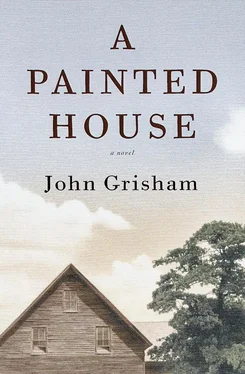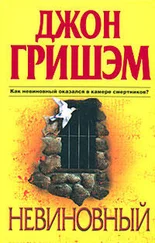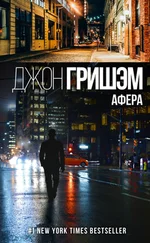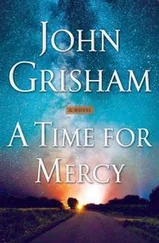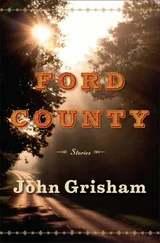We had no idea what it paid, but we were certain it was more profitable than farming.
When I heard the diesel engine, I knew Otis was back. I walked hand in hand with my mother to the edge of the road, and sure enough, between our house and the bridge were three mounds of new gravel. Otis was spreading it, slowly working his way toward us. We stepped back under a tree and waited.
My head was clear, and I felt strong. My mother kept tugging at my shoulder, as if she thought I might faint again. As Otis drew near, I stepped closer to the road. The engine roared; the blade churned up dirt and gravel. We were getting our road fixed, a most important event.
Sometimes Otis waved, sometimes he did not. I saw his scars and his black eye patch. Oh, the questions I had for that man!
And I saw only one monkey. He was sitting on the main frame, just beyond the steering wheel, and he looked very sad. I scanned the grader for his little partner, but there were no other monkeys.
We waved at Otis, who glanced at us but did not wave back. This was a terrible sign of rudeness in our world, but then Otis was different. Because of his war wounds, he had no wife, no children, nothing but isolation.
Suddenly the grader stopped. Otis turned and looked down at me with his good eye, then motioned for me to climb aboard. I instantly moved toward him, and my mother rushed forward to say no. Otis yelled, “It’s okay! He’ll be fine.” It didn’t matter: I was already climbing up.
He yanked my hand and pulled me up to the platform where he sat. “Stand here,” he said gruffly, pointing to a little spot next to him. “Hold on here,” he growled, and I clutched a handle next to an important-looking lever that I was terrified to touch. I looked down at my mother, who had her hands on her hips. She was shaking her head as if she could choke me, but then I saw a hint of a smile.
He hit the throttle, and the engine behind us roared to life. He pushed the clutch with his foot, moved a gearshift, and we were off. I could’ve walked faster, but with the noise from the diesel it seemed as if we were racing along.
I was on Otis’s left side, very close to his face, and I tried not to look at his scars. After a couple of minutes, he seemed oblivious to my presence. The monkey, however, was quite curious. He watched me as if I were an intruder, then he slinked along on all fours, slowly, prepared to lunge at me at any moment. He jumped onto Otis’s right shoulder, walked around the back of his neck, and settled onto his left shoulder, staring at me.
I was staring at him. He was no bigger than a baby squirrel, with fine black fur and little black eyes barely separated by the bridge of his nose. His long tail fell down the front of Otis’s shirt. Otis was working the levers, moving the gravel, mumbling to himself, seemingly unaware of the monkey on his shoulder.
When it was apparent that the monkey was content just to study me, I turned my attention to the workings of the road grader. Otis had the blade down in the shallow ditch, tilted at a steep angle so that mud and grass and weeds were being dug out and shoved into the road. I knew from previous observations that he would go up and down several times, cleaning the ditches, grading the center, spreading the gravel. Pappy was of the opinion that Otis and the county should fix our road more often, but most farmers felt that way.
He turned the grader around, ran the blade into the other ditch, and headed back toward our house. The monkey hadn’t moved.
“Where’s the other monkey?” I said loudly, not far from Otis’s ear.
He pointed down at the blade and said, “Fell off.”
It took a second for this to register, and then I was horrified at the thought of that poor little monkey falling over the blade and meeting such an awful death. It didn’t seem to bother Otis, but the surviving monkey was undoubtedly mourning the loss of his buddy. He just sat there, sometimes looking at me, sometimes gazing away, very much alone. And he certainly stayed away from the blade.
My mother hadn’t moved. I waved at her, and she waved at me, and again Otis took no part in any of it. He spat every so often, a long stream of brown tobacco juice that hit the ground in front of the rear wheels. He wiped his mouth with a dirty sleeve, both right and left, depending on which hand happened to be engaged with a lever. Pappy said that Otis was very levelheaded — tobacco juice ran out of both corners of his mouth.
Past our house I could see, from my lofty position, the cotton trailer in the middle of a field and a few straw hats scattered about. I searched until I found the Mexicans, in the same general area as usual, and I thought of Cowboy out there, switchblade in his pocket, no doubt quite proud of his latest killing. I wondered if he’d told his pals about it. Probably not.
For a moment I was frightened because my mother was back behind us, alone. This didn’t make any sense, and I knew it, but most of my thoughts were irrational.
When I saw the tree line along the river, a new fear gripped me. I was suddenly afraid to see the bridge, the scene of the crime. Surely there were bloodstains, evidence that something awful had happened. Did the rain wash them away? Days often went by without a car or truck passing over the bridge. Had anyone seen Hank’s blood? There was a good chance the evidence would be gone.
Had there really been bloodshed? Or was it all a bad dream?
Nor did I want to see the river. The water moved slowly this time of the year, and Hank was such a large victim. Could he be ashore by now? Washed up on a gravel bar like a beached whale? I certainly didn’t want to be the one to find him.
Hank had been cut to pieces. Cowboy had the nearest switchblade and plenty of motive. It was a crime that even Stick Powers could solve.
I was the only eyewitness, but I’d already decided I would take it to my grave.
Otis shifted gears and turned around, no small feat with a road grader, as I was learning. I caught a glimpse of the bridge, but we were too far away to see much. The monkey grew weary of staring at me and shifted shoulders. He peeked at me around Otis’s head for a minute or so, then just sat there, perched like an owl, studying the road.
Oh, if Dewayne could see me now! He’d burn with envy. He’d be humiliated. He’d be so overcome with defeat that he wouldn’t speak to me for a long time. I couldn’t wait for Saturday. I’d spread the word along Main Street that I’d spent the day with Otis on the road grader — Otis and his monkey. Just one monkey, though, and I’d be forced to tell what happened to the other. And all those levers and controls that, from the ground, looked so thoroughly intimidating but in reality were no problem for me at all. I’d learned how to operate them! It would be one of my finest moments.
Otis stopped in front of our house. I climbed down and yelled, “Thank you!” but he was off without a nod or word of any sort.
I suddenly thought about the dead monkey, and I started crying. I didn’t want to cry, and I tried not to, but the tears were pouring out, and I couldn’t control myself. My mother came running from the house, asking what was wrong. I didn’t know what was wrong; I was just crying. I was scared and tired, almost faint again, and I just wanted everything to be normal, with the Mexicans and the Spruills out of our lives, with Ricky home, with the Latchers gone, with the nightmare of Hank erased from my memory. I was tired of secrets, tired of seeing things I was not supposed to see.
And so I just cried.
My mother held me tightly. When I realized she was frightened, I managed to tell her about the dead monkey.
“Did you see it?” she asked in horror.
I shook my head and kept explaining. We walked back to the porch and sat for a long time.
Читать дальше
